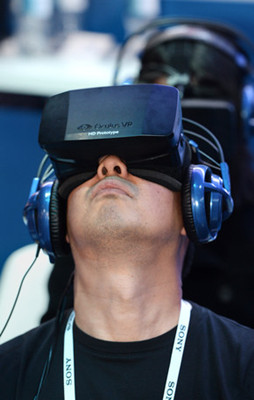商业报道
Facebook and virtual reality
脸谱网与虚拟现实
A game of goggles
一场头戴式3D眼镜的赌博
The social network makes another expensive bet on the future
社交网络又向未来押了一笔高昂赌注
AT SXSW, a techie festival that took place inTexasearlier this month, some lucky attenders were able briefly to immerse themselves in HBO's fantasy television series, “Game of Thrones”.
在本月初,影视音乐互动大会上,一个技术展在德克萨斯州拉开帷幕,一些幸运的参加者能短暂的将自己沉浸在HBO的奇幻电视剧《权利的游戏》中。
By donning virtual-reality goggles made by Oculus VR, people could see how the world looked from the top of the 700-foot-tall Wall that protects the Seven Kingdoms from enemies that lurk beyond.
戴上由Oculus VR公司制造的虚拟现实眼镜,人们可以看见从700英尺高的城墙顶端俯瞰的世界,而这城墙保卫着七大王国免受潜伏在城墙外敌人的侵扰。
The digital rendition was so lifelike that gazing down from the Wall gave some folk vertigo.
其细节重现栩栩如生以至于从城墙上俯瞰时会使人眩晕。

Such a compelling experience explains why Oculus Rift, the company's virtual-reality headset, has captivated keen gamers.
如此令人信服的体验解释了该公司的虚拟现实耳机Oculus Rift俘获了狂热游戏迷的原因。
It has also caught the attention of Facebook, which announced on March 25th that it had bought Oculus VR for around 2 billion.
这也引起了Facebook公司的注意,在3月25日,其宣布已用约20亿美元收购了Oculus VR公司。
This deal, which comprises 400m in cash and the rest in Facebook stock, comes not long after the social network's purchase of WhatsApp, a messaging app, for 19 billion.
这笔交易包括4亿美元的现金交易,其余部分以Facebook公司股票交易。且这就发生在Facebook公司以190亿美元收购信息传送应用程序WhatsApp的不久之后。
WhatsApp at least has more than 450m users.
WhatsApp应用程序至少有超过4.5亿用户。
Oculus VR, a startup that is less than two years old, has so far only sold its headsets to game developers.
Oculus VR这一新创办不超过两年的公司,目前只向游戏开发者卖出了它的虚拟现实耳机。
So why is Facebook paying so much for it?
那么为什么Facebook公司为购买它付出了这么多?
And why is it betting on a much-hyped technology that has so far failed to live up to its promise?
且这一大量炒作的技术,迄今仍未兑现其承诺,Facebook公司为什么在这一技术上押注?
Part of the answer is that Mark Zuckerberg, Facebook's boss, and his colleagues think advances in areas such as graphics processing power and thin, high-resolution screens mean that virtual-reality headsets are at last ready for mass consumption.
部分原因是Facebook公司的老板Mark Zuckerberg以及他的同僚们认为,例如图形处理能力,薄而分辨率高的显示器等领域的发展进步,意味着虚拟现实耳机终于为大众消费做好了准备。
David Ebersman, the firm's finance chief, reckons the potential to mint money in gaming alone justifies Oculus's price tag.
公司的首席财务官David Ebersman认为Oculus仅在游戏上赚钱的潜力就证明它的价签是合理的。
Other firms spy the same opportunity.
其它公司侦寻着同样的机会。
Sony recently unveiled a prototype virtual-reality headset for its PlayStation 4 game console and Microsoft is rumoured to be developing one for its Xbox console.
索尼公司最近公布了一款为其PlayStation 4游戏平台打造的虚拟现实耳机的原型机,且有传言称微软正为其Xbox游戏平台研发一款虚拟现实耳机。
But some gaming veterans reckon the headsets will appeal only to hard-core gamers.
但是一些游戏老手认为这种耳机将只会吸引狂热的游戏玩家。
And Facebook's purchase of Oculus has infuriated some of those.
且Facebook公司收购Oculus公司这一举动已经将他们中的一些人激怒。
After the deal was announced, Markus Persson, a prominent game developer, tweeted that he had just cancelled a plan to bring a game to Oculus.
在交易宣布后,一个著名的游戏开发商Markus Persson就在推特上说他刚刚取消了一个想交由Oculus公司研发游戏的计划。
“Facebook creeps me out,” he added.
“Facebook公司吓到我了,”他补充道。
That is unlikely to bother the social network, whose decision to buy Oculus was also motivated by a broader strategic concern.
那不太可能扰乱Facebook社交网络公司,其收购Oculus公司的决策也是出于一个更加广泛的战略要求。
Facebook grew up in an era dominated by personal computers.
Facebook公司是在个人电脑主宰的时代发展起来的。
It failed miserably to spot that computing was shifting fast to new mobile “platforms” such as smartphones.
可悲的是它过去没能发现电脑正迅速向智能手机等移动平台转移。
It has since raced to catch up in the world of apps and is now keen not to miss the next generation of big platforms.
此后它迅速去追赶全世界应用程序的发展,而现在不希望错过下一代的大平台。
Mr Zuckerberg thinks virtual reality could be one of these and foresees people putting on Oculus's goggles in their homes to, say, attend virtual classes or see their doctors.
Zuckerberg先生认为虚拟现实可能是这些平台的其中之一。他说他预见人们戴上Oculus公司的虚拟现实眼镜在家里参加虚拟课程或看医生。
But experiments in marrying entertainment with headgear, like 3D televisions that require viewers to wear special glasses, have been disappointing.
但就像观看3D电视需要佩戴特殊眼镜一样,将娱乐设备设计成头戴式的效果一直不尽如人意。
“Two billion dollars seems like a significant amount of money to pay for something that has yet to emerge,” says Brian Wieser of Pivotal, a research firm.
研发公司Pivotal的Brian Wieser说:“对于一些尚未实现的东西来说,20亿美元似乎是一笔大投资。”
True, but unlike Google, which spends lots of money on futuristic projects in its secretive “Google X” lab, Facebook is willing to let startups try riskier stuff, and then pay princely sums to acquire them.
确实如此,谷歌公司在神秘的“Google X”实验室进行的未来项目中投入大量资金,然而与谷歌公司不同,Facebook公司宁愿让新创业的公司试验风险较高的事物,然后支付天价收购它们。
Other firms have also been buying talent and technology: according to Thomson Reuters, an information provider, the Oculus purchase took the total spent on technology M&A worldwide since the start of 2014 to 65.2 billion—the highest amount for the equivalent period since 2000.
其他公司也正在购买人才和技术,据信息提供者Thomson Reuters透露,自2014年初以来,Oculus公司在世界范围内的技术并购中,总共花费了625亿美元,这是自2000年以来同期最高值。
The Oculus deal also represents a twist in the tech industry's very own Game of Thrones, an epic of incessant plotting and warfare.
科技行业自身的权力游戏是一篇永不停歇的阴谋和战争的史诗,在这场游戏中,Oculus公司的交易也代表着一个转变。
Google wants its Glass smart specs to be a new mass-computing platform and this week said Luxottica, a seller of high-end eyewear, would help it make them look nicer.
谷歌公司希望其智能眼镜设备能够成为新一代的集群计算平台,与此同时,一家高端眼镜设备销售商Luxottica也表示将全力帮助该产品优化外观。
Google's vision of the future involves complementing the real world seen through its specs with a visual feed from its search engine and other services.
谷歌眼镜可以通过其搜索引擎和其他服务实现信息视觉化展示,谷歌公司对未来的愿景包含透过谷歌眼镜实现对真实世界的补充。
Facebook's is of people immersed in lifelike digital worlds.
而Facebook公司的愿景是人们可以沉浸在逼真的数字世界。
Their rivalry should be a real spectacle.
他们的竞争应该是场真正的奇观。



